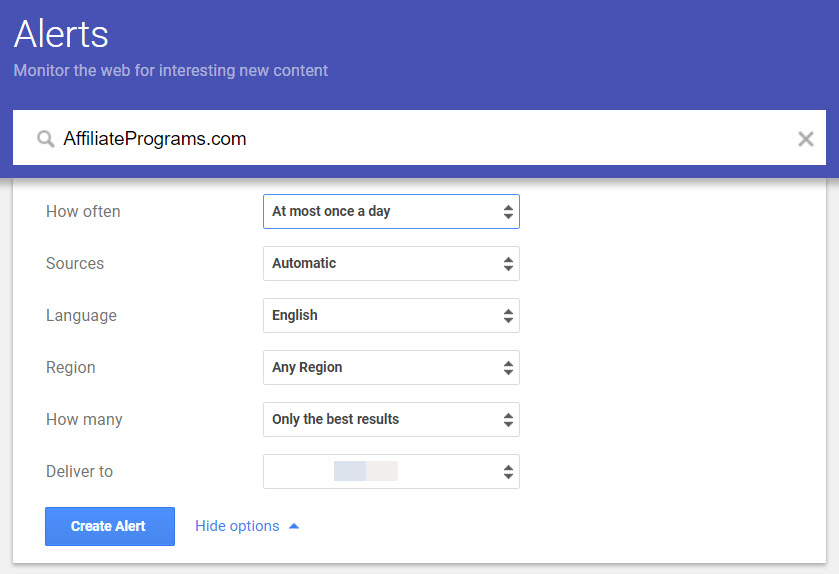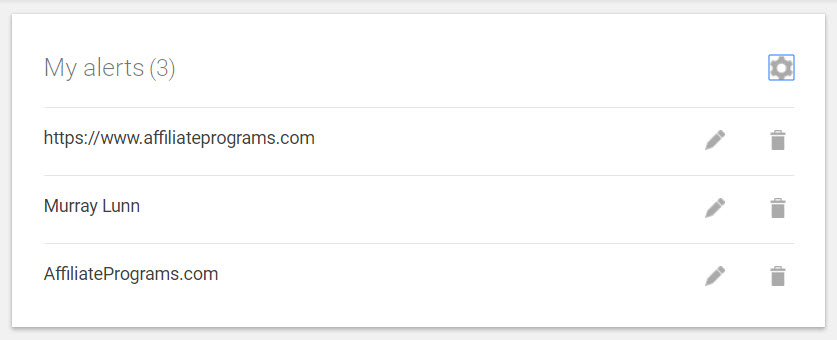Google Alerts is a handy tool to watch your name online, so you don’t miss opportunities to build or manage your brand’s reputation. It’s also handy for spying on the competition.
The tool provides mentions as they come through or a daily/weekly roundup. The use case we’re talking about is how you can set this keyword to your name, brand, and website.
Sounds beneficial for your online activities? This article explains how to set up Google Alerts and use it for a variety of beneficial media monitoring capabilities, for free.
How to Set Up Google Alerts: The Free Social Media Monitoring Tool
Follow along and you’ll have Google Alerts set up within minutes.
Step 1: Go to Google.com/alerts
You can take a moment to get a lay of the interface including alert suggestions. The alert suggestions recommend topics you may find interesting though you can disregard them for now.

Google will also show a suggested account if you’re logged in with a Google account. This will default mentions based on your name and email tied to the account.
Step 2: Add Something You Want to Track
I’d suggest terms like:
- Your name
- Brand name
- Website name
- Website URL
- Primary keywords/phrases
You can play around with the terms as you see fit. For now, do the name of your brand and website.

Google Alerts displays an alert preview showing some of the results you can expect with the term.
You can leave the options to default though you may want to set “How Often” to “At most once a day”. You can also click the gear wheel to tell Alerts when to deliver this digest.
Step 3: Confirm the Alert and Add More Mentions
Get a couple of names, terms, and phrases in there.

Google Alerts isn’t super sophisticated so check back and update the terms to refine your online monitoring. Be sure to add in some competitors and competitive terms, too!
7 Best Social Media Monitoring Uses with Google Alerts
Okay, if you’re stuck in there and set up Google Alerts you’re not wondering what’s the point.
There are a couple of reasons to use it:
- Reputation Management. Monitoring your name (brand & URL) helps you identify online reviews. This lets you quickly respond to negative comments before they’re overblown or malicious. A quick response also “strikes” when someone’s emotional – like in a passionate review – helping you further reinforce branding else diffuse the situation.
- Detect Backlinks. Webmaster Tools provides this information but may show up delayed. Google Alerts can quickly identify when your site gained a backlink, so you may thank the webmaster. Or, present a backlink opportunity where you could reach out and ask the webmaster to hyperlink the brand mention.
- Check the Competition. Apply the same monitoring to your competitors. Tracking competitors help you discover where they’re building links, and who they’re influencing, or working with. Knowing what your competitors are doing can help you maintain an edge and sometimes outplay them. You could slide in competitive brand mentions to promote your offers as an alternative, too.
- Find Influencers. Use the alerts to see who’s sharing your brand and content on social. You may discover influencers on these channels with massive followings. Contact them and you could create a relationship further promoting your brand to their audience.
- Follow Trends. Use Alerts in combination with Google Trends to monitor up-and-coming terms and phrases. Quickly jump on the trend if you notice a spike in content creation and discussion.
- Discover Talent. Try setting the alerts to job pitches and portfolio updates using an industry term + hire me. You could find new, untapped talent before the competition. Or, get a jump on hiring a freelancer the moment they become available.
- Get R&D. The Web is larger than your handful of social media networks and favorite websites. An alert could tip you off on new, up-and-coming platforms and niche communities. Or, attune you to new content topics, interesting industry trends, and discussions not part of the mainstream. These are parts of your R&D to thrive.
Social media listening becomes whatever you need it to be once you have the tools set up. Give it a try and see what you’ll discover by monitoring your brand, keywords, and industry.
Wrapping Up
Call it paranoia or savvy branding but you’ll want to add Google Alerts to your toolbox. Having the ability to watch your name online is incredibly powerful for brand building and reputation management. It also presents many opportunities to improve your website, generate leads, and spy on the competition.
We recommend setting Google Alerts to at least report weekly. This should include your brand, 3-5 primary keywords, and a handful of competitors.
Spend an hour reviewing what’s found and creating an action plan – then get to it!




